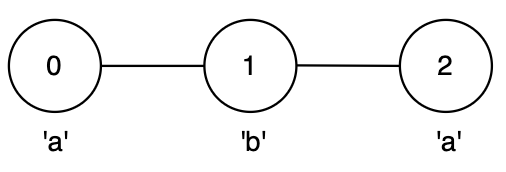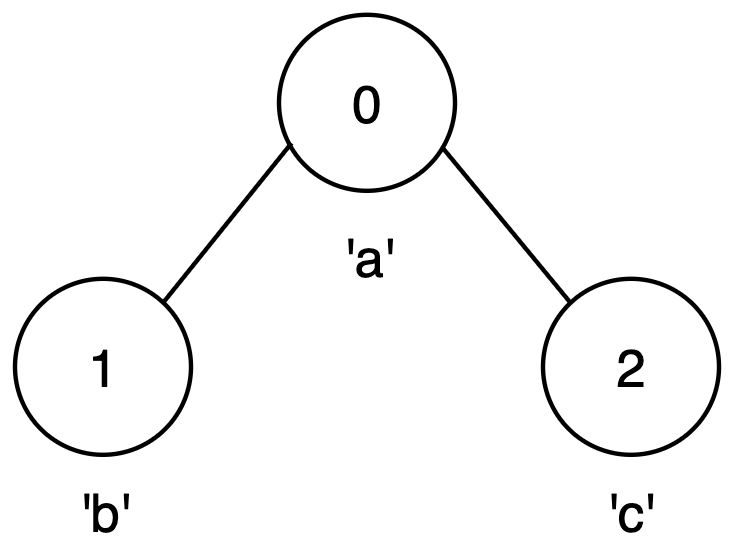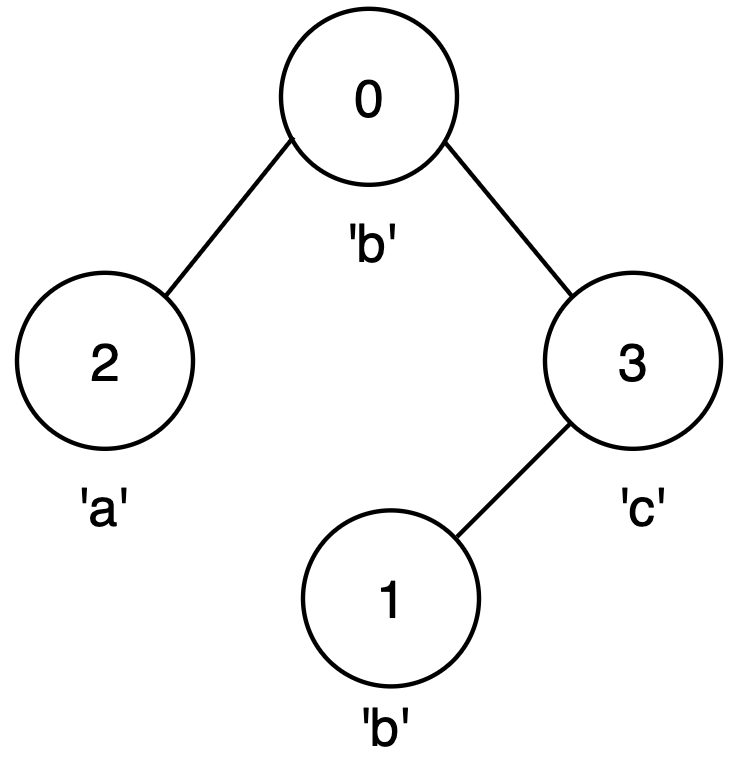LeetCode-in-Java
3615. Longest Palindromic Path in Graph
Hard
You are given an integer n and an undirected graph with n nodes labeled from 0 to n - 1 and a 2D array edges, where edges[i] = [ui, vi] indicates an edge between nodes ui and vi.
You are also given a string label of length n, where label[i] is the character associated with node i.
You may start at any node and move to any adjacent node, visiting each node at most once.
Return the maximum possible length of a palindrome that can be formed by visiting a set of unique nodes along a valid path.
Example 1:
Input: n = 3, edges = [[0,1],[1,2]], label = “aba”
Output: 3
Explanation:

- The longest palindromic path is from node 0 to node 2 via node 1, following the path
0 → 1 → 2forming string"aba". - This is a valid palindrome of length 3.
Example 2:
Input: n = 3, edges = [[0,1],[0,2]], label = “abc”
Output: 1
Explanation:

- No path with more than one node forms a palindrome.
- The best option is any single node, giving a palindrome of length 1.
Example 3:
Input: n = 4, edges = [[0,2],[0,3],[3,1]], label = “bbac”
Output: 3
Explanation:

- The longest palindromic path is from node 0 to node 1, following the path
0 → 3 → 1, forming string"bcb". - This is a valid palindrome of length 3.
Constraints:
1 <= n <= 14n - 1 <= edges.length <= n * (n - 1) / 2edges[i] == [ui, vi]0 <= ui, vi <= n - 1ui != vilabel.length == nlabelconsists of lowercase English letters.- There are no duplicate edges.
Solution
import java.util.ArrayList;
import java.util.List;
@SuppressWarnings("java:S135")
public class Solution {
public int maxLen(int n, int[][] edges, String labelsStr) {
char[] labels = labelsStr.toCharArray();
// collect lists of adjacent nodes
int[][] adj = adj(n, edges);
// size of int to store n bits bitmask
int bSize = 1 << n;
int[][][] cache = new int[n][n][bSize];
int maxLength = 0;
for (int i = 0; i < n; i++) {
// find palindromes of odd length (one node in the middle)
int localLength = findPalindrome(adj, labels, i, i, 0, cache);
maxLength = Math.max(maxLength, localLength);
// find palindromes of even length (two nodes in the middle)
for (int j : adj[i]) {
if (labels[i] == labels[j]) {
int length = findPalindrome(adj, labels, i, j, 0, cache);
maxLength = Math.max(maxLength, length);
}
}
}
return maxLength;
}
private int findPalindrome(int[][] adj, char[] labels, int i, int j, int b, int[][][] cache) {
if (cache[i][j][b] != 0) {
return cache[i][j][b];
}
int b1 = set(b, i);
b1 = set(b1, j);
int length = i == j ? 1 : 2;
int maxExtraLength = 0;
for (int i1 : adj[i]) {
if (get(b1, i1)) {
continue;
}
for (int j1 : adj[j]) {
if (i1 == j1) {
continue;
}
if (labels[i1] != labels[j1]) {
continue;
}
if (get(b1, j1)) {
continue;
}
int extraLength = findPalindrome(adj, labels, i1, j1, b1, cache);
maxExtraLength = Math.max(maxExtraLength, extraLength);
}
}
cache[i][j][b] = length + maxExtraLength;
return length + maxExtraLength;
}
private boolean get(int b, int i) {
return (b & (1 << i)) != 0;
}
private int set(int b, int i) {
return b | (1 << i);
}
private int[][] adj(int n, int[][] edges) {
List<List<Integer>> adjList = new ArrayList<>();
for (int i = 0; i < n; i++) {
adjList.add(new ArrayList<>());
}
for (int[] edge : edges) {
adjList.get(edge[0]).add(edge[1]);
adjList.get(edge[1]).add(edge[0]);
}
int[][] adj = new int[n][];
for (int i = 0; i < n; i++) {
adj[i] = adjList.get(i).stream().mapToInt(j -> j).toArray();
}
return adj;
}
}

